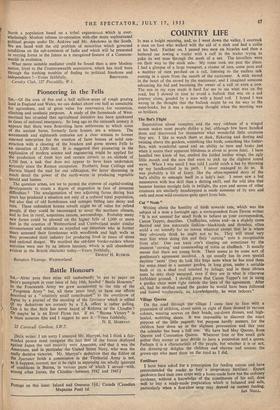Pioneering in the Fells
SIR,—Of the area of five and a half million acres of rough grazing land in England and Wales, we can deduct about one half as unsuitable for agriculture, and of great value for reservation for recreation, climbing and aesthetic purposes. A study of the farmsteads of West- morland has revealed that agricultural initiative has been quickened in times of national emergency. So long ago as the sixteenth century it appears that there were flourishing farm settlements to which some of the ancient barns, formerly farm houses, are a witness. The seventeenth and eighteenth centuries are a clear witness to former renewed enterprises for the erection of farm houses of solid con- struction with a clearing of the bracken and gorse strewn Fells to an elevation of 1,200 feet. It is suggested that pioneering in the application of modern science and engineering might be applied for the production of fresh leys and certain cereals to an altitude of 1,500 feet, a task that does not appear to have been undertaken seriously since the Roman occupation. Prothero, Jesse Collings and Darwin blazed the trail for our edification, the latter discussing in much detail the power of the earth-worm in producing .vegetable mould and humus.
The question arises, are we to permit the expense of capital-costing developments to create a degree of stagnation in face of immense difficulties ? The amalgamation of two adjoining farms during lean years has produced a situation not only of a reduced rural population, but also that of old farmhouses and cottages falling into decay and ruin. These redundant houses rebuilt might be of value for retired People, if they could be encouraged to essay the northern climate, and to live in rural, sometimes remote, surroundings. Probably many new farms could be planted on the higher fells of 1,000 or more feet in the counties of Westmorland and Cumberland under similar circumstances and stimulus as impelled our ancestors who in former times screened their farmhouses with woodlands and high walls as they prosecuted their industry for producing food in times of stress and national danger. We recollect the old-time border-raiders whose activities were met by an inborn heroism, which is still abundantly evident in the British character today.—Yours. faithfully,


























 Previous page
Previous page